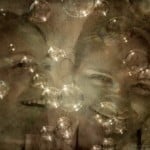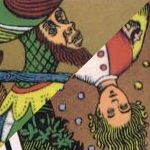This post concludes the series on transcendence in naturalism. Part 1 introduced naturalistic transcendence, part 2 covered nature as a source of transcendence, and part 3 explored community. Now we conclude with mind.
In our recent poll on symbols of transcendence, nature proved the most popular, with cosmos a close second. One that didn’t rate highly was mind. Perhaps it should come as no surprise. On the face of it, the very idea of it seems absurd: how could you possibly find something greater than yourself in, well… yourself?
But that’s exactly the misconception I seek to challenge: mind is not ourselves, or at least not what we routinely think of as such.
We are not our minds
What most of us, most of the time, think of as ourselves is more or less our conscious ego, especially the part where we feel like we’re thinking, willing, imagining, feeling, remembering, deliberating, and so on. It’s our most immediate experience, and it’s what we may fear ceasing to exist after death. However, this represents only a tiny fraction of the total process of an individual’s mind.
The unconscious is far more vast. To give a taste: cognitive psychologist Timothy D. Wilson estimates in Strangers to Ourselves that our minds assimilate some 11,000,000 pieces of information per second from our sense organs, but only about 40 can be processed consciously. The rest, according to Wilson, are handled by the unconscious.
There may even be parts of the mental process external to the individual body. The field of embodied cognition studies the mind in its holistic interaction with body and environment. Clark and Chalmers even go so far as to ask whether there is any difference between storing information in memory or in a notebook. Such mental prostheses, they argue, free up mental processing space by offloading some of it into the environment. This is a controversial claim, but one worth a moment’s pondering.
By mind I mean the whole mind of the individual, conscious and unconscious. You could also say psyche, a term more popular in Jungian psychology. It is the root of psychology, and originally meant “soul.” Psyche is one of many words that have been thoroughly naturalized, just as “god” and “spirit” may one day come to be.
Deep and vast
So, the other parts of the mind do a lot, but do they do anything interesting, or just take care of the tedious stuff?
Consider this: Where do your words come from when you speak? You may have a vague plan of the idea you want to convey, but do you consciously decide the words or even the nuances of the ideas? Or do you discover these things in the process of speaking?
Ancient poets like Homer and Hesiod claimed to receive their lines from a muse. Perhaps, in some sense, they were right. The “muse” lies in the unconscious. In a similar vein, Carl Jung said we are not the authors of our thoughts; they are handed to us. I tend to agree.
Jung also felt that messages from the unconscious await us in our dreams, and such content somehow “compensates” or balances the conscious mind. I’m not sure how to test that claim, so I remain skeptical. It may be a case of seeking pattern where there is none. But there is one thing that experience has proven to me time and again: my unconscious mind can do certain things that ”I” can’t.
A power beyond “me”
 When I sit down at my Isis altar with an emotional knot that I’ve been working on for days without resolution, and that knot looses within minutes of chanting and talking to Isis, it’s hard to argue with that.
When I sit down at my Isis altar with an emotional knot that I’ve been working on for days without resolution, and that knot looses within minutes of chanting and talking to Isis, it’s hard to argue with that.
Somehow, an unconscious process is facilitated by the images and actions involved in devotion. Perhaps the image of a supernormal mother figure like Isis and the bodily actions of rhythmic chanting, gift offering, and intimate confession are mental prostheses in the manner proposed by Clark and Chalmers. Ritual devotion may not be unique in its ability to facilitate this, but it appears to be one way to do it, and an effective one in my experience.
I’m sure other people’s experiences with ritual may be quite different. Regardless, this example demonstrates, like a pebble cast into a well, just how far down the unconscious mind goes. It is not “me”; it is radically “other.” It is greater in both degree and kind. To sound its depths is indeed to discover something greater than oneself.
So, although mind did not rate highly on our poll, I’d like to suggest reconsidering it, not only because it is perhaps the most well-established among naturalists (via Jungian Paganism), but also because it helps us to discover transcendence “closer than your own jugular.”
Subscribe to The Spiritual Naturalist Society
Learn about Membership in the Spiritual Naturalist Society
__________
The Spiritual Naturalist Society works to spread awareness of spiritual naturalism as a way of life, develop its thought and practice, and help bring together like-minded practitioners in fellowship.
__________
Written by B.T. Newberg. This article first appeared at HumanisticPaganism.com.














